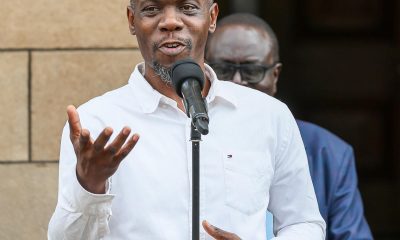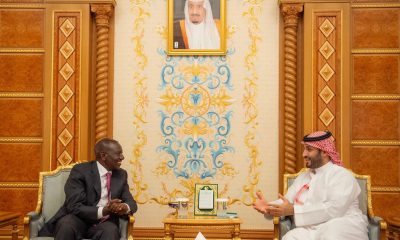News
It’s A Miracle! Stephen Munyakho, Kenyan Saved From Death Row in Saudi Arabia Is Finally Back Home
The Muslim World League stepped forward to pay the bulk of the diya, while Kenyans both at home and in the diaspora contributed whatever they could.

The clock had just struck past midnight when the international arrivals terminal at Jomo Kenyatta International Airport transformed into a sanctuary of overwhelming emotion.
At 12:50 am on Tuesday, July 29, 2025, Stephen Munyakho stepped onto Kenyan soil for the first time in 14 years, his freedom purchased not just with money, but with the collective prayers and unwavering determination of a nation that refused to let one of its own perish in a foreign land.
Dorothy Kweyu had waited 14 long years for this moment.
As her son emerged from the arrival gates, time seemed to collapse.
The years of knocking on doors, the sleepless nights filled with worry, the countless prayers whispered in the darkness—all of it dissolved as mother and son embraced.
Her tears were not just of joy, but of relief so profound that words seemed inadequate to capture the magnitude of this reunion.
“I’m glad to be back home in Kenya. My presence here today is nothing short of a miracle, and I want to begin by thanking Allah for the gift of life,” Munyakho said, his voice carrying the weight of a man who had stared death in the face and lived to tell about it.
The walking stick he carried was more than just an aid—it was a symbol of respect for his grandmother, a gesture that spoke to the cultural values that had sustained him through his darkest hours.
The journey to this moment began in April 2011 when Munyakho, working as a warehouse manager in Saudi Arabia, found himself entangled in a dispute with his Yemeni colleague, Abdul Halim Mujahid Makrad Saleh.
What started as a workplace disagreement ended in tragedy, with Saleh’s death leading to Munyakho’s arrest.
Initially convicted of manslaughter and sentenced to five years, his world crumbled when an appeal overturned the ruling, replacing it with a murder conviction and a death sentence under Sharia law.
For years, Munyakho’s case became a symbol of the challenges faced by Kenyans working abroad.
His mother became the face of parental anguish, traversing corridors of power and pleading with anyone who would listen.
The Bring Back Stevo Strategy Committee emerged as a beacon of hope, coordinating efforts that would eventually span continents and touch hearts across the globe.
The breakthrough came when the victim’s family agreed to accept diya—blood money—a provision under Islamic law that allows for forgiveness in exchange for compensation.
The sum was staggering: approximately 150 million shillings. It was an amount that seemed impossible for a single family to raise, but the Kenyan spirit proved otherwise.
The Muslim World League stepped forward to pay the bulk of the diya, while Kenyans both at home and in the diaspora contributed whatever they could.
Churches held special prayers, mosques opened their doors for supplications, and social media campaigns kept Munyakho’s story alive in the public consciousness. It was a remarkable display of unity that transcended religious and ethnic boundaries.
Foreign Affairs Principal Secretary Korir Sing’oei was among the officials who received Munyakho at the airport, representing a government that had worked tirelessly behind the scenes to navigate the complex diplomatic waters.
The presence of Ambassador Mohammed Ruwange from Saudi Arabia underscored the delicate negotiations that had made this moment possible.
As Munyakho stood surrounded by family, friends, and well-wishers, the magnitude of what had transpired was not lost on anyone present.
This was not just about one man’s freedom—it was about the power of collective action, the strength of faith, and the unwavering bonds that tie a people together regardless of distance or circumstance.
“I’m grateful to Allah for this second chance that I have been granted. It’s wonderful to be back home, but please allow me some time to rest and reorganize myself before I can speak further,” he said, his words measured and thoughtful, those of a man who understood the preciousness of the gift he had been given.
The scenes at JKIA were a testament to the human spirit’s capacity for hope and perseverance. There were songs of praise, tears of joy, and prayers of thanksgiving.
Family members who had held vigil for over a decade could finally exhale. The nightmare that had haunted them for so long was finally over.
Munyakho’s return marks the end of one chapter and the beginning of another. He comes home to a Kenya that has changed in his absence, but also to a family and community that never stopped believing in the possibility of this day.
His story serves as a reminder that sometimes, against all odds, miracles do happen—and they often come wrapped in the collective love and determination of people who refuse to give up on one another.
As the sun rose over Nairobi on July 29, 2025, Stephen Munyakho was no longer a man condemned to die in a foreign land.
He was simply a son who had come home, carrying with him the scars of his ordeal but also the profound gratitude of someone who had been granted the rarest of gifts: a second chance at life.
Kenya Insights allows guest blogging, if you want to be published on Kenya’s most authoritative and accurate blog, have an expose, news TIPS, story angles, human interest stories, drop us an email on [email protected] or via Telegram
-

 News2 weeks ago
News2 weeks agoTHE FIRM IN THE DOCK: How Kaplan and Stratton Became the Most Scrutinised Law Firm in Kenya
-

 Economy2 weeks ago
Economy2 weeks agoIran Demands Arrest, Prosecution Of Kenya’s Cup of Joe Director Director Over Sh2.6 Billion Tea Fraud
-

 Grapevine1 week ago
Grapevine1 week agoA UN Director Based in Nairobi Was Deep in an Intimate Friendship With Epstein — He Even Sent Her a Sex Toy
-

 Business2 weeks ago
Business2 weeks agoKPC IPO Set To Flop Ahead Of Deadline, Here’s The Experts’ Take
-

 Politics2 weeks ago
Politics2 weeks agoPresident Ruto and Uhuru Reportedly Gets In A Heated Argument In A Closed-Door Meeting With Ethiopian PM Abiy Ahmed
-

 Investigations1 week ago
Investigations1 week agoHow Mexico Drug Lord’s Girlfriend Gave Him Away
-

 Business2 weeks ago
Business2 weeks agoSafaricom Faces Avalanche of Lawsuits Over Data Privacy as Acquitted Student Demands Sh200mn Compensation in 48 Hours
-

 Investigations2 weeks ago
Investigations2 weeks agoKenya’s DCI Opens Probe on Russian Man Who Secretly Filmed Sex Escapades With Women — But There’s a Slim Chance They’ll Ever Get Him























